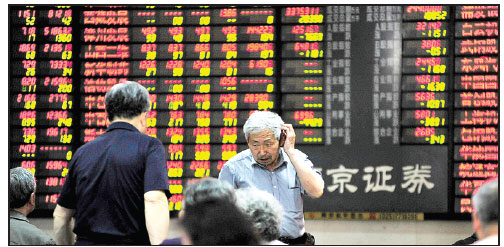Shares fall amid speculation on government stimulus program
|
Investors check stock prices at a securities brokerage in Nanjing, Jiangsu province.CFP |
Stocks fell on Friday, led by commodity companies, amid speculation that improving economic data in March and a surge in new credit will prompt authorities to refrain from adding stimulus.
The Shanghai Composite Index fell 0.1 percent from a three-month high, trimming its weekly advance to 3.1 percent.
A gauge of materials companies dropped 0.8 percent as steelmakers tumbled.
New credit, industrial output, fixed-asset investment and retail sales all picked up last month to beat analysts' forecasts.
For the first quarter, the economy grew 6.7 percent, in line with analyst estimates and the slowest pace in seven years.
The benchmark stock gauge has climbed 16 percent since Jan 28, paring its loss for the year to 13 percent, as the government unleashed more measures to bolster the economy and stabilize the financial markets.
A number of first-quarter indicators have shown the economy is "pretty robust", central bank Deputy Governor Yi Gang said in Washington on Thursday, citing electricity, transportation, inflation and producer-price data.
"The latest economic figures are slightly better than expectations, but it remains to be seen whether the recovery can be sustained," said Zhang Gang, a strategist at Central China Securities Co who is based in Shanghai.
"Investors worry whether this could mean less government stimulus policies going forward."
The Shanghai Composite closed at 3,078.12 points. The CSI 300 Index slipped 0.1 percent. Hong Kong's Hang Seng China Enterprises Index fell 0.3 percent, while the Hang Seng Index halted a seven-day rising streak, its longest in a year, with a 0.1 percent drop.
Fixed-asset investment climbed 10.7 percent in the first three months from a year earlier, as property construction rebounded. Home sales jumped 71 percent in March.
Aggregate financing was 2.34 trillion yuan ($360.9 billion) in March, the People's Bank of China said, as monetary easing filtered through the financial system.
A measure tracking material stocks recorded the biggest loss among the CSI 300's 10 industry groups. Commodity producers have led this year's rebound as the government ramped up spending to stimulate the economy and pledged to cut capacity in bloated industries.
Wuhan Iron & Steel Co retreated 1.7 percent, while Angang Steel Co dropped 2.6 percent after saying it expects a net loss for the first three months of 2016. Copper producer Tongling Nonferrous Metals Group Co slumped 2.7 percent.
Industrial output expanded 6.8 percent in March from a year earlier and retail sales rose 10.5 percent, the National Bureau of Statistics said on Friday. That compared with median forecasts of 5.9 percent and 10.4 percent, respectively, in Bloomberg surveys.
Margin traders increased holdings of shares purchased with borrowed money for a second day on Thursday, with the outstanding balance of margin debt on the Shanghai Stock Exchange rising by 0.3 percent to 515.5 billion yuan, the highest since Feb 24.
Energy producers led losses in Hong Kong, with China Shenhua Energy Co and China Petroleum & Chemical Corp falling at least 1.9 percent. The Hang Seng Index's 14-day relative strength index on Thursday rose to the cusp of 70, a level that some traders consider as signaling a decline. The city's benchmark gauge rose to its highest close this year on Thursday.



















